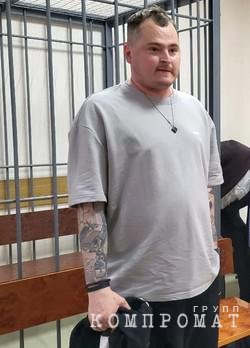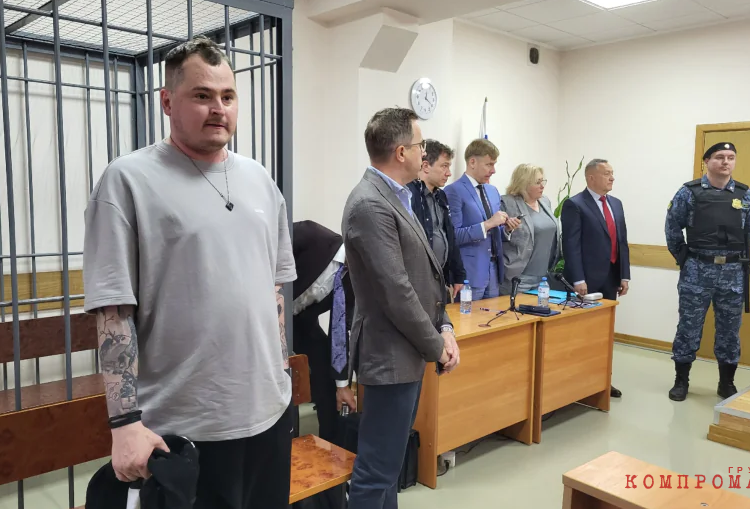Artur Kontrabaev was sentenced to 3.5 years for electronic registration
The Central District Court of Tula sentenced the ex-Minister of Informatization of the Tula government Artur Kontrabaev and businessman Alexey Chernousovaccused of embezzlement of 68 million rubles of budget funds, which, according to the investigation, took place during the creation and implementation of the regional health information system (RISS) in the Tula region.
 Artur Kontrabaev
Artur KontrabaevDespite the conclusion of the re-examination, which did not find in the case of damages, the court found the defendants guilty and sentenced them to 3.5 years and three years in prison, respectively, in a penal colony.
 Alexey Chernousov
Alexey ChernousovHowever, they did not take the defendants into custody, leaving them under house arrest pending an appeal in the Tula Regional Court. This is especially important for Artur Kontrabaev, who suffers from a brain tumor and has been undergoing chemotherapy since autumn last year.
A case of six years
The criminal case was initiated by the Investigative Committee in 2017. Initially, the accused was alone. Artur Kontrabaev was charged with exceeding official powers (Article 286 of the Criminal Code of the Russian Federation). However, the investigation was unable to prove this composition. And in February 2020, the same actions were qualified as embezzlement on an especially large scale (part 4 of article 160 of the Criminal Code of the Russian Federation), which was imputed to the ex-official. Then a new defendant appeared in the case – the general director and co-owner of Smart Delta Systems LLC Alexey Chernousov. He was charged with complicity in the commission of this crime (part 5 of article 33, part 4 of article 160 of the Criminal Code of the Russian Federation). Initially, both defendants were under house arrest. However, after the indictment, Chernousov was arrested. He had to spend six months in a pre-trial detention center before he was transferred to house arrest. Kontrabaev, due to the presence of a serious illness – a brain tumor (astrocytoma), was placed under house arrest, under which he remained until the verdict. Both defendants faced up to ten years in prison.
The trial in the Central District Court of Tula started in May 2021 and took exactly two years. The investigation claimed that the defendants stole 68 million rubles allocated from the budget for the creation of new software, and instead of the new system, the region received a product created 15 years ago.
The metropolitan Smart Delta Systems LLC, which won the competition, did not produce any new developments, but simply used the Infoclinika medical information system (MIS), patented by it back in 2005, in the Tula region, or rather, one of its modules – Electronic Registry. The exclusive rights of the regional administration to the system were not transferred.
The government of the Tula region, recognized as victims in the case, does not agree with the accusation. It believes that the system was created and has been in operation for a long time, and there is no damage in the case. The victim did not file a civil claim in the case. Moreover, according to the rating of digitalization of regions, compiled in February 2021 by the government of the Russian Federation, the Tula region was among the leaders.
Expertise is another stumbling block that was constantly mentioned during the judicial investigation. The first expert, whose opinion was presented in court and in the criminal case, ruled that the work on the creation of RISZ had not been completed, and, accordingly, their cost was zero rubles. Already in 2022, it was decided to conduct a re-examination, due to which the meetings had to be postponed for quite a long time.
The new expert review determined that the Tula Oblast RISD exists and was created. However, there are nuances – during the study, the variants of the program of 2013, 2018 and 2022 were taken, while it is not possible to objectively establish that the media contains information from those years. The court found Artur Kontrabaev and Aleksey Chernousov guilty. Artur Kontrabaev is also prohibited from holding positions in the civil service for three years, Alexei Chernousov is prohibited from engaging in activities related to government contracts.
Expert opinions
The defense of the defendants argued that the examinations that formed the basis of the charges were carried out during the investigation with violations, and the study was carried out by non-state experts Alexei Babanin and Dmitry Zherebkov. The first of these, according to the defense, is actually is a full-time expert of the Investigative Committee and was involved in a number of high-profile cases related to the creation of State Information Systems (GIS).
It was Babanin who conducted the examination in the case of the former deputy head of the Ministry of Energy Anatoly Tikhonovaccused of embezzlement of more than 600 million rubles allocated for the creation of the information system of the Federal State Budgetary Institution “Russian Energy Agency”, as well as the former head of the IT department of Rosreestr Alexandra Bibikova. The latter was charged with embezzlement of more than 225.5 million rubles, which were supposed to be spent on the “Unified State Register of Real Estate” (EGRN). Both cases are already in court.
As for the case of Kontrabaev and Chernousov, the court doubted in the study and appointed a second computer-technical examination. A study conducted by the Center for Independent Expertise of Information Technology in Samara came to the opposite conclusion. The new examination found no damage in the case. Experts confirmed the cost of work performed in 2013-2014 under three government contracts for the creation, as well as maintenance and refinement of the system.
Deadlines for defendants
The defense asked the defendants to acquit. During the debate of the parties, the prosecutor asked for real terms for the defendants: for Kontrabaev, five years in prison, and for Chernousov, 4.5 years in a penal colony. The court gave them less. Kontrabaev was sentenced to 3.5 years in prison, and Chernousov – to three years.
However, despite the arguments of the defense, the court eventually agreed with the prosecutor’s office and delivered a guilty verdict, although it imposed sentences less than those required by the state prosecution. Artur Kontrabaev received three years and six months in prison and a fine of 300,000 rubles. At the same time, he was credited for the two years and seven months that he was under house arrest. The same measure of restraint will remain in effect until the entry into force of the sentence. It is possible that the court took into account the fact that the ex-minister had a serious illness.
Aleksey Chernousov was sentenced to three years in prison. However, taking into account the term of house arrest, as well as six months spent in a pre-trial detention center (this time is recalculated according to the formula “a day in an isolation cell – a day and a half in a colony”), the court released the businessman in connection with serving his sentence. At the same time, the court confiscated the Infoclinika system from the entrepreneur. Representatives of the defense said they would appeal against the verdict as unlawful and unreasonable. They will formulate their position in detail after they receive the text of the court decision in their hands on Friday.
According to the new rules, judge Olga Mityaeva on May 23 announced only the introductory and operative parts of the verdict, therefore, it is still unclear what she based it on.
He noted that during the process, the prosecutor’s office could not name a single witness who would indicate the fact of a crime and the presence of damage.
The defense of both defendants plans to file an appeal with the Tula Regional Court, in which it intends to seek an acquittal. According to Andrei Bastrakov, the transfer of his client to a colony is tantamount to a death sentence.
The lawyer said that if the judicial act still stands, Artur Kontrabaev should be released from serving his sentence due to his serious illness. Materials that astrocytoma is included in the list of diseases with which it is impossible to serve time were previously attached to the case file.









